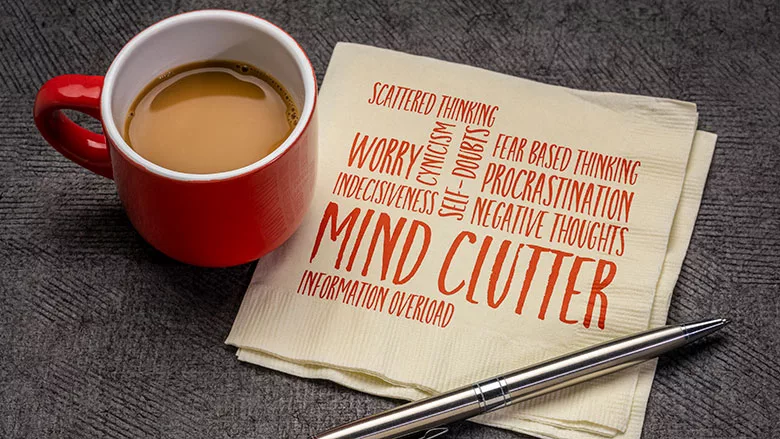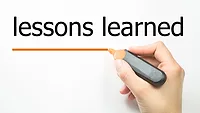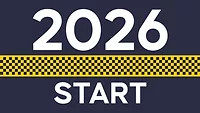How Restoration Pros Can Find Clarity by Taming Mind Clutter

Photo credit: marekuliasz / iStock / Getty Images Plus via Getty Images
We all have limited time to reach our goals, so the time we do have is far too precious to waste on noise. The buzzing that is all around us can steal our focus and take our attention away from what is really important. The noise of the day, the frenzy of calls and tasks, the fires to put out at work (and sometimes at home) can all serve as constant distractions for the mind.
Given the opportunity, the mind prefers to work on the many small tasks rather than the big thoughts. It’s easier and more fun for our brain. But it’s in the big thoughts that we find the big ideas for our big future.
In order to make way for the big thoughts, we must periodically clear our mind of the clutter and make time to be as mentally still as we can. The brain serves us all day and this is its recharge. It is in this stillness of the mind that the big thoughts have space to grow.
When we are able to find and maintain a level of stillness, we can become almost superhuman with surprising clarity, capabilities, and contentment. But even once realized, stillness doesn’t stick around without work. Although our mind enjoys stillness, impulses are its enemy. Given the opportunity, the mind will jump on whatever distraction comes its way.
Mind clutter doesn’t just block the big, visionary ideas. It gets in the way of everyday decisions that we make. Every leader has stories to tell about times when they made a decision that they shouldn’t have. I know I have a few. It’s usually because I felt overwhelmed or under pressure, with a mind that was tired from the clutter of it all.
The time to make a quick judgement is not when stress is clouding our view. With clarity of thought being blurred by the stress of the immediate issue, we can make the wrong decision. Everything changed for me when I learned to take the time to calm myself and consider my options.
When I find stress, anger, or frustration taking over, I take deeps breaths, a short walk, run an errand with the music cranked up—whatever I need to do to center myself. Afterward, I find I can see things more clearly and make better decisions. What’s funny is that sometimes, just by taking that time to step away, I find the need for a decision has gone away. Either it was a situation that I realized could fix itself or someone else had already handled it.
Here are some additional ways that I have found to curb the mental clutter.
Carve out time for your mind to be quiet
This doesn’t mean you need to just sit in a corner. Instead, it can be an active time for your body but quiet time for your mind.
Although quiet time for me is key to my productivity and focus, a few years ago, I wouldn’t have said this. I was working all the time but not being as effective as I should have been. I mustered the courage and went to a meditation class. It ended up being awesome! I left there feeling empowered yet relaxed and knew this new tool was going to be a game charger for me.
Since then, I always add some form of meditation into my schedule. What this looks like are quiet activities such as a walk alone, a massage, exercise, or a hike to a beautiful view. All of these are meant to give my mind a rest so it can recharge and serve me better.

Limit the inputs
Be aware of the source of your noise and work to limit it. For some the noise is social media, TV, or the barrage of other info being projected toward us at all times. For others it’s coworkers who rely on our help too much. For parents it is the array of responsibilities and activities that go along with having kids.
There is a line between what actually needs our attention and what is just taking it. We need to be at our kid’s soccer game, but we don’t need to run the concession stand. We need to be available to help coworkers with things that fall under our expertise, but we don’t need to solve all their problems.
All these things are not just taking our time, but they are fogging up our brain. Instead of using our mind to work through the things on our priority list, it’s thinking about the things on other people's lists. Our mind thinks it’s fun to be in the middle of everything, so unless we control the inputs, it will keep having a grand ol’ time wallowing in the clutter.
Stop overthinking
Overthinking is the art of creating problems that were never even there. We make things harder by overthinking. It causes slowdowns in productivity, shakes our confidence, and often just makes things worse. Many times we already hold solutions to the problems that we are overthinking. All we need to do is slow down. As the fog of the mind clutter clears, often the answer appears.
Overthinkers must find ways to halt the overthinking train when it starts. Some tactics that have worked for others include walking away from the issue and resetting, isolating the issue using visual methods such as diagramming on a whiteboard or writing in a journal, and using the classic “count to ten” method. It’s important to put a plan in place for when we overthink, so we will know how to work it. Perhaps, over time, we will be able to replace our plan entirely with a clearer mind.
Learn more
Once we limit our inputs, then we need to replace the noise with something useful for our mind to chew on. But we need to be careful not to replace noise with different noise. Instead, we should find constructive input that feeds our mind in a useful way. Listening to an audiobook or podcast is a great way to impart useful info as long as we’re not using it to drown out the quiet time. Even with good inputs, our mind will need the quiet time to process and recharge.
I block off time on my calendar for learning. This is when I read, take an online class, or do research. My learning time is a fixed part of my schedule that I won’t change for many things. I find that it gives my brain not just the intellectual fuel to serve me later but the quiet time of no distractions, just a gentle flow of good input.
Find a mentor
We all have someone we aspire to be like. I don’t mean someone who has the job or business that we want, although we should have that person too. I mean the person who appears to be calm in the face of chaos, seems to always be present, and looks like they have it all under control. With a mentor, not only will we learn a lot, but we will have an accountability partner for when things go off the rails.
To get the most out of a mentorship, I suggest spending some time together. Although quick calls are good once the relationship is established, you will get more out of it if you actually spend some time with them. Invite them on a fishing trip or to a baseball game. Find a way to carve out time where you can talk but not be rushed.
I used to golf, not because I like to golf, but because it was a great way to spend time with a man who intrigued me with his refined, gentlemanly exterior and incredibly kind heart. He was retired after spending his career in a high-pressure profession. He always seemed so relaxed and in control, even when his golf game wasn’t great that day, so spending time chatting with him and getting a glimpse at the world through his eyes was enlightening and gave me a level of calmness to live up to.
In the face of constant distractions and increasing demands on our time, the power to simplify and focus our mind lies within us. Each of the strategies listed above offers a path toward mental clarity and heightened productivity. I invite you to embark on this journey of transformation. Choose one method from the list, integrate it into your daily routine, and observe the difference it makes. You may be surprised to find how even a single, subtle shift can open doors to profound changes, not just within yourself but also in your relationships and interactions with others.
Looking for a reprint of this article?
From high-res PDFs to custom plaques, order your copy today!








